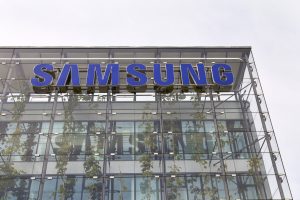In South Korea, climate activism is on the rise. In 2019, a nationwide coalition of more than 300 organizations came together to form the Climate Crisis Emergency Action Network. The following spring, youth climate activists filed a lawsuit against the South Korean government to demand more dramatic emissions cuts, arguing that their fundamental rights were at stake. In October 2020, activists saw a major victory when President Moon Jae-in pledged that the country would achieve carbon neutrality by 2050.
But Samsung Electronics, the largest corporation in South Korea, has managed to dodge pressure to reduce emissions. Unlike its rivals Sony and Apple, Samsung has yet to commit to 100 percent renewable energy worldwide, leaving the company’s global operations reliant on fossil fuels.
As the single biggest electricity consumer in South Korea, Samsung Electronics’ domestic carbon footprint is immense and has only continued to grow. More than 70 percent of the tech conglomerate’s total electricity consumption occurs in South Korea, fueled primarily by coal and gas. In 2019, Samsung Electronics alone consumed enough power to meet the needs of more than 4 million South Korean households, or nearly one-fifth of the national total.
Samsung Electronics’ failure to adopt renewable electricity has enabled the company’s domestic greenhouse gas (GHG) emissions to rise unchecked, soaring by 137 percent over less than a decade. In 2020, Samsung Electronics’ GHG emissions (scope 1-3) amounted to approximately 30 million tonnes of carbon dioxide equivalent, roughly equivalent to Norway’s total GHG emissions. Unless drastic changes are made, Samsung’s continued reliance on fossil fuel sources threatens to undermine South Korea’s national GHG emission reduction goals.
While Samsung’s emissions continue to rise in South Korea, the company has taken a different route abroad, revealing a double standard at play. In 2018, activists were optimistic when the tech giant pledged that it would commit to 100 percent renewable energy use in the United States, Europe, and China.
But nearly four years on, the pledge has not been followed by a global 100 percent renewable energy commitment, as many had hoped. Instead, the announcement is increasingly seen as a performative gesture geared toward protecting the brand’s image in the U.S. and Europe.
Samsung’s operations in the United States, Europe, and China comprise just a small fraction of the company’s total electricity consumption. More than 80 percent of Samsung Electronics’ total electricity use occurs outside these three regions, powered predominantly by coal and gas.
Among the world’s biggest tech companies, Samsung stands out for its failure to commit to 100 percent renewable energy worldwide. In recent years, a growing cadre of tech giants have signed on to RE100, an initiative that brings together companies in a commitment to 100 percent renewable electricity use across their operations. Both Apple and Sony have already pledged to utilize 100 percent renewable energy and achieve carbon neutrality across their own operations, and Apple has further expanded its commitment across its supply chain. By contrast, Samsung has yet to sign onto RE100 or to issue a global carbon neutrality pledge.
Ample opportunities exist in South Korea for renewable electricity procurement. Since the end of 2020, five new procurement methods have become available in the country, including green premiums, purchase of renewable energy certificates (RECs), and power purchase agreements (PPAs). The new renewable electricity procurement methods enable companies like Samsung to increase their clean energy use.
As Samsung pushes its environmental initiatives in the United States and Europe, it continues to garner positive press coverage and accolades for its efforts. In April 2021, Samsung Electronics received an award from the U.S. Environmental Protection Agency for the company’s renewable energy use in the United States. More recently, the BBC reported on Samsung’s use of discarded fishing nets in some small components of its phones, pointing out that “experts welcomed the green initiative.”
But the trivial scale of these achievements is overshadowed by the double standard at work as Samsung relies on climate-change causing fossil fuels to generate astronomical profits, particularly on its home front. As a leading company in South Korea, it is time for Samsung to stop playing by two sets of rules and commit to 100 percent renewable electricity by 2030 across its entire global supply chain, including at home.

































